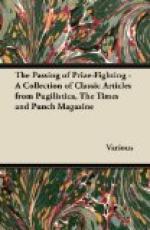["One of the most interesting exhibits (at the Royal Horticultural Society’s Grape and Dahlia Show at Chiswick) were clusters of grapes with the scent and taste of strawberries and raspberries, as grown in Transatlantic hothouses.”—Daily Paper.]
I’ll tell thee everything I can;
There’s little to relate:
I met a simple citizen
Of some “United State.”
“Who are you, simple man?”
I said,
“And how is it you live?”
And his answer seemed quite ’cute
from one
So shy and sensitive.
He said, “I make electric cats
That prowl upon the leads,
To prey upon the brutes who raise
Mad music o’er our heads.
I also make all sorts of things
Which much convenience give;
In fact, I’m an inventor spry,
And that is how I live.
“And I am thinking of a plan
For artificial hens,
And automatic dairy-maids,
And self-propelling pens.”
“Such things are stale,” I
made reply,
“They’re old,
and flat, and thin.
Tell me the last thing in your pate,
Or I will cave it in!”
His accents mild took up the tale:
He said, “I’ve
tried to make
A sirloin out of turnips, and
A vegetable steak.”
I shook him well, from side to side,
To stimulate his brain;
“You’ve got some newer dodge,”
I cried,
“And that you must explain.”
He said, “I always willingly
Do anything to please.
What do you say to growing grapes
That taste like strawberr-ees!
They’re showing off at Chiswick
now,
As I a sinner am,
Some big black Hamburgs which, when pressed,
Taste just like raspberry
jam.”
So now whene’er I drink a glass
Of wine that seems like rum,
Or peel myself an orange that
Reminds me of a plum,
Or if I come across a peach
With flavour like a bilberry,
I weep, for it reminds me so
Of Chiswick’s Grape and Dahlia Show,
And that ’cute man I used to know,
Who could at will transform a sloe
Into a thing with the aro-
-ma of all fruits known here below,
From apricot to mulberry.
* * * * *
NATIVE GROWTH.
According to a case about oysters—instead of a case, it ought to have been a barrel—heard before Mr. Alderman WILKIN,—and as the case may be still sub-Aldermanice, we have nothing to say as to its merits or demerits,—it appears, that in September, 1889, the price of Royal Whitstable Natives was 14s. per 100; i.e., 1s. 3d. for a baker’s dozen of thirteen. Though why a baker should be allowed “a little one in,” be it oysters or anything else, only Heaven and the erudite Editor of Notes and Queries know. But, without further allusion to the baker, who has just dropped in accidentally as he did into the conversation




